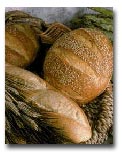
 Provincetown Portuguese Cookbook
Provincetown Portuguese Cookbook
Traditional Portuguese foods, beloved by locals and adopted by washashores| Home | Foreword | Table of Contents |
Vino Verde | Appetizers | Linguica | Breads | Soups | Fish | Meat | Sweets | Extras | Order Form
| Breads Pão The smell of freshly baked Portuguese bread is one of my most vivid memories as a child growing up in Provincetown during the 50's and 60's. Although penny candy stores abounded in Provincetown in those days, it wasn't unusual for Provincetown school children to purchase a loaf of bread at the Portuguese Bakery, rather than a bag of candy, on their way to and from school. The delectable smell of bread baking was surely as alluring as the assortment of bite-sized Charleston Chew's, Baby Ruth's or Bonamo's Turkish Taffy that filled the cases at Joe Marshall's store or Tillie's Market. Mamie's Portuguese Bread | Portuguese Sweet Bread | Fried Portuguese Bread | Portuguese Sweet Toast à la Red Inn | Bean Pot Bread |  The bread was baked then by Mr. Antonio Brito, who came from northern Portugal. People still talk about Mr. Brito's bread today. My mother would send my sister or me to the bakery with twenty-five cents for a long, oval shaped Viana loaf. As a child I always thought it was a "Vienna" loaf and used to wonder why Portuguese bread was named for a city in Austria. It wasn't until I went to Portugal as an adult that I learned the bread was named after the town of Viana do Castelo in the Minho region north of Oporto near Mr. Brito's birthplace. When Mr. Brito decided to close his business and move back to Portugal, everyone was devastated, thinking that they would have to go to Portugal to buy a decent loaf of bread. Although different from Mr. Brito's, excellent Portuguese bread, rolls and sweet bread are still baked in Provincetown at the Portuguese Bakery by Mr. Antonio Ferreira in the same location that Mr. Brito used. In addition to breads, Mr. Ferreira bakes authentic Portuguese pastries. He also serves breakfast and lunch. During the summer, expect to wait in a rather long line at the Portuguese Bakery. Although the advent of heavy-duty electric mixers with dough hooks, food processors and bread machines has generated renewed interest in bread making, hardly anyone makes Portuguese bread at home today unless it's at the holidays. Even then, it's usually only the sweet bread, massa cevada. At Easter, the bread dough is studded with up to a dozen well-washed, raw eggs in their shells just before the bread is popped in the oven. The eggs cook inside the bread while it is baking. The Portuguese bread recipes in this book make more than one loaf and are not appropriate for food processors or bread machines. They are, however, suitable for electric mixers with dough hooks and four- to five- quart mixing bowls. |
 © Provincetown Portuguese Festival
© Provincetown Portuguese Festival www.iamprovincetown.com
www.iamprovincetown.com